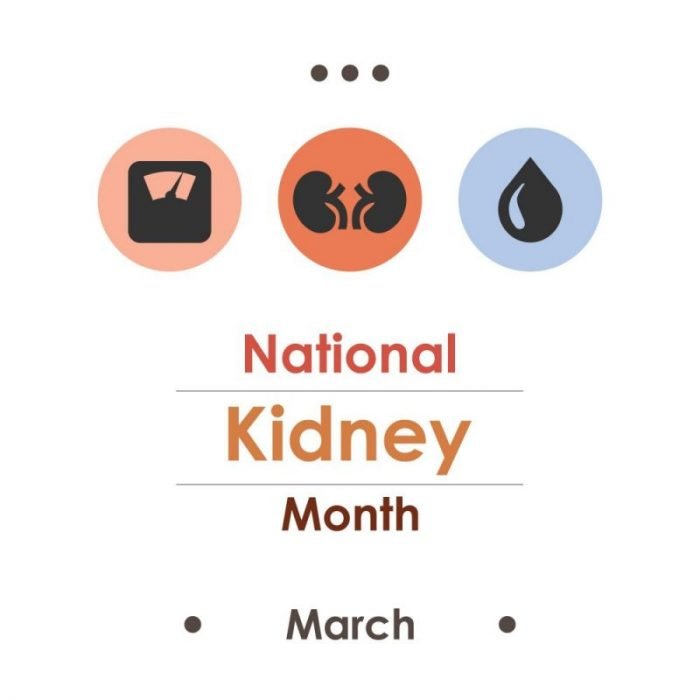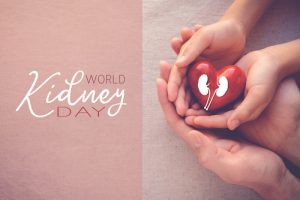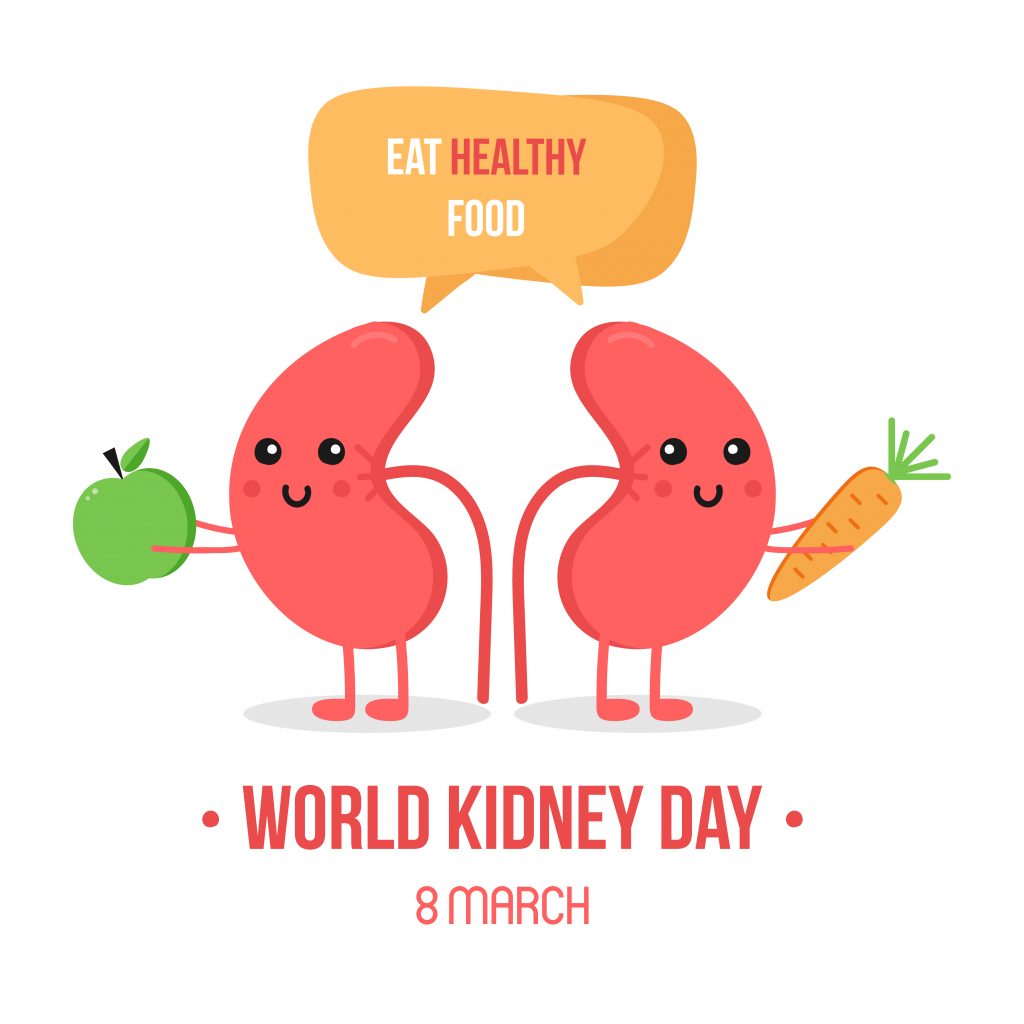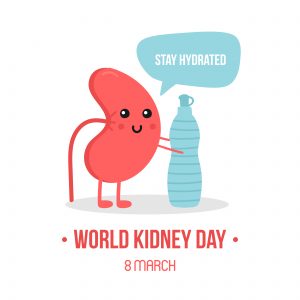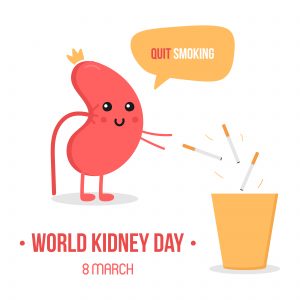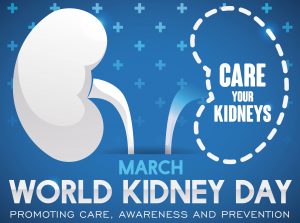The month of March brings with it the promise of spring on the horizon, but more importantly it brings awareness to a very worthy cause. March is National Kidney Month, and it is the ideal opportunity for all of us to find out more about the function and importance of the kidney, as well as the potential risk for kidney disease: particularly so that you can aid in reducing your aging parent’s risk factors.
This year “World Kidney Day” is acknowledged on March 8th. According to their website, World Kidney Day is a “global awareness campaign aimed at raising awareness of the importance of our kidneys to our overall health and to reduce the frequency and impact of kidney disease and its associated health problems worldwide.”
For example: did you know that 1 in 3 American adults are at risk for kidney disease? Major risk factors for kidney disease include diabetes, high blood pressure, a family history of kidney failure, and being 60 or older.
In this blog article, we will provide information on kidney health and the importance of regular screenings: in particular for seniors and our elderly adults.
The Importance Of Our Kidneys
The kidneys are two, fist-sized organs found in your lower back. These organs are responsible for filtering your 200 liters of blood each day. They maintain overall health by performing all of the following functions:
- Regulating the body’s salt, potassium, and acid content;
- Removing drugs from the body;
- Balancing the body’s fluids;
- Releasing hormones to regulate blood pressure;
- Producing an active form of vitamin D to promote strong, healthy bones; and
- Controlling production of red blood cells.
All About Our Kidneys
Our kidneys are critical organs in the human body. It is possible to live with only one kidney, but without the function of the kidney the body requires extensive medical intervention to maintain health and wellbeing. Unfortunately, more than 26 million Americans suffer from kidney disease and many of them are unaware that they have it or the extent of the disease. This disease causes more than 590,000 cases of kidney failure throughout the nation, putting nearly 100,000 people in need of kidney transplants.
As the ninth leading cause of death throughout the United States, kidney disease should be something that you are aware of throughout your elderly care journey with your aging parent.
The Causes Of Kidney Disease
Kidney disease is often referred to as the “silent killer;” it often presents no symptoms in its earliest phase. Education, awareness, lifestyle choices, and knowing what can cause your kidneys to fail can make a significant difference in preventing kidney disease. Kidney disease develops when kidneys lose the ability to remove waste and maintain fluid and chemical balances in the body. The severity of chronic kidney disease (CKD) depends on how well the kidneys filter wastes from the blood. It can progress quickly or take many years to develop.
Diabetes is the number one cause of CKD, with high blood pressure being the second leading cause; one in three with diabetes and one in five with high blood pressure will develop kidney disease.
While there is no cure for kidney disease, the progression of the disease can be slowed and managed by controlling diabetes and high blood pressure. If a person is diagnosed with CKD, regular medical supervision is important. Medications and lifestyle changes can slow the progression of the disease. These include:
- Keep your blood pressure stable.
- If diabetic, stay in your target blood sugar range as much as possible.
- Increase activity and exercise; which helps control blood pressure and blood sugar levels.
- Maintain a healthy weight.
- Quit smoking.
- Meet with a dietitian to create a “kidney-healthy” eating plan.
Symptoms Of Kidney Disease
Unfortunately in the earliest stages of CKD, there usually are no obvious symptoms that a person would notice. The Centers for Disease Control and Prevention (CDC) says that 10 percent of adults in the U.S. have CKD, but most don’t know they do. The signs of kidney disease can be similar to many other medical conditions. Your kidneys are so efficient that they will adjust and compensate for any loss of function – which makes it more difficult to recognize when a problem exists. According to the Mayo Clinic, these symptoms can include any of the following:
- High blood pressure
- Diabetes
- Heart disease
- High cholesterol
- Vomiting and Nausea
- Loss of appetite
- Fatigue and weakness
- Problems sleeping
- Changes in urine output
- Muscle twitches and cramps
- Decreased mental sharpness
- Swelling of the feet and ankles
- Persistent itching
Kidney disease can lead to many complications, including cardiovascular disease, fluid retention, anemia, an increased risk of bone fractures, and a decrease in the strength of your immune system; which makes you more likely to contract infections.
Kidney Health In The Elderly
Kidney disease can develop at any time, but those over the age of 60 are more likely than not to develop kidney disease. While some problems can become apparent at a relatively early age, the onset of CKD is more likely to happen later in life. According to recent studies at Johns Hopkins University, more than 50 percent of seniors over the age of 75 are believed to have kidney disease. Kidney disease has also been found to be more prevalent in those over the age of 60 when compared to the rest of the general population.
The National Kidney Foundation (NKF) says “many people don’t realize that, as we age, we lose kidney function. Unfortunately, older Americans may not realize they are at increased risk until it is too late.”
Regular kidney function screenings are strongly encouraged for all seniors so that they can take steps to reverse any signs of kidney disease before it is too late. Thus, the NKF urges everyone over the age of 60 to be screened for kidney disease, and recommends an annual screening with a simple urine albumin test that checks for protein in the urine-the earliest sign of kidney damage-as well as a blood test for kidney function.
Kidney disease often develops slowly with few symptoms, and many people don’t realize they have it until the disease is advanced. Awareness of kidney disease, especially for those at risk, is the first step to preventing, or slowing the progression of kidney disease.
The Importance Of National Kidney Month
During National Kidney Month and year-round, we are reminded to “Take care of your hard-working kidneys and they’ll help take care of you.”
On World Kidney Day and throughout the Month of March, the National Kidney Foundation is offering free screenings to those most at risk for kidney disease (which is anyone with diabetes, high blood pressure or a family history of kidney failure.) Locations and information can be found on their calendar.
Simple preventive measures include getting regular exercise, eating a healthy diet and avoiding or limiting use of alcohol and tobacco products, can help our loved ones. By taking charge of our health and empowering ourselves with information about CKD signs, symptoms, treatment and prevention, most seniors can expect to live long, healthy lives that are free of complications from CKD.
